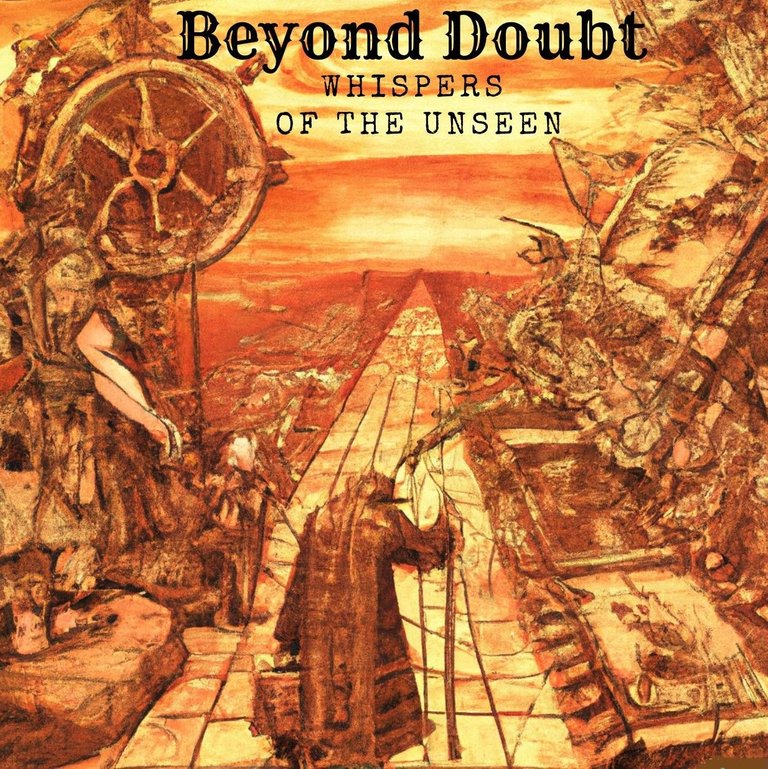Beyond Doubt: Whispers of the Unseen - Chapter 1

And now Dear Reader I will take you on a seemingly endless journey.
A trip that will take you to places I might have visited many moons ago.
It´s a tale that came back to me when I meditated on one of my past lives. A life I told you about in my unbelievable true story.
As promised in that story I will now share this story with you.
Prologue
Because even an endless journey has a beginning
The valley looked lovely these days, the paddy fields cascading down until they reached the bottom. The reeds along the river, which ran through the canyon, swayed in the wind, while the sun nourished the earth.
In the distance stood the Kranusha, the great volcano, which erupted hundreds of years ago and formed the basis of the nutrient-rich soil in this region. The valley must have had a devastating appearance at that time. A blackened mass, with here and there the charred remains of what had once been trees.
If this area had been populated at the time, this last eruption meant the end of that civilization. Their ashes now serve as the foundation of our civilization.
A civilization that stems from a group of fishermen who, generations ago, moved into the mountains to escape the onslaught of the violent sea people. They bombarded the coast, where our former habitat was located, with bloody attacks.
They were called "Krotan Dua", the sea devils. They came in the early morning and chased through the village with spears and torches. They burned down the huts, looking for the women of the village. Those who couldn't get away were later found mutilated beyond recognition.
These devils always came when all the healthy men were at sea and only the elderly and sick were present to defend the village. A few encounters with the Krotan Dua soon marked the end of an era, an era in which my tribe lived off what the sea had to offer.
Chapter One
"The lore tells of a long and grueling journey through vast grassy plains, stinking swamps, and sharp rocks, which shelter large predators. Bears, snakes, and immense birds of prey destroyed young lives during those traveling months if not years when my distant ancestors roamed this land in search of a new home.
It is unclear how long my tribe wandered before encamping at the foot of a mountain range with only one long narrow pass leading up. Of the two scouts sent out, only one returned. Nevertheless, on his advice, the tribe moved into the mountains.
Along the narrow path, they began the ascent, which would take several days. The mountain had a cruel, grim air, a grimness that grew every hour of the climb.
On the left side of the path, a steep rock wall rose. To the right a chasm, which grew deeper and more vicious as they ascended. A chasm filled with sharp protrusions ready to devour those who take one wrong step. The teeth of the chasm knew what to do with the fallen.
After a journey of several days through this hellish pass, there was the final part of this seemingly endless journey. The narrow pass opened and it was as if Aka, the god of the earth, had swept away all obstacles with a single movement of his hand.
A barren stone plain, a vast plateau with a few rocks. This first view of the top did not bode well. The inhumane climb had only led to this dead wasteland. That must have been the first thoughts of those who had reached the top.
The remaining scout walked to the edge of the stone abyss. There he stopped, turned to the trunk, and stepped back. He didn't crash, he just stood there floating in what seemed mid-air.
When the tribesmen reached the edge of the plateau, they saw a green haze, an oasis of trees and plants in the midst of this dead land. A blooming heart, surrounded by a lifeless shell.
During their previous trip, the scouts had found some signs that this area had once been inhabited. The most obvious were the remains of steps carved into the mountainside. Particularly in the upper area, several were still largely untouched. The first step was directly behind the edge of the abyss, where the scout now stood.
Further on this tableland, there was a stone formation, which must have been made by human hands with adjoining certainty. Probably as a tribute to the gods, who apparently became displeased with the behavior of their worshipers and eventually drove them out of this unruly paradise.
The oasis below was watered by a stream that sprang from the mountains to the east and descended through this valley. The widening stream snaked between the mountains toward the great volcano.

Since their arrival on this plateau, my tribe has called this plain home. Because of the strong strategic location, she chose not to settle in the valley, but here high above the oasis. The region was still unknown and the fear of foreign enemies was still great.
Yet this area suited the tribe very well. The valley was the mother, she who provides for the bodily needs. The mountains are the father, the strength, and the protector. Together they formed the perfect balance, in both our physical and spiritual world.
The earliest generations had not sought contact with whom may have lived in the surrounding areas for fear of new escalations. But curiosity all too often trumps fear.
Young adventurers went on long journeys in an increasingly wider area. For a long time, these journeys brought nothing but death, and fewer men were inclined to participate. These dangerous expeditions seemed to be nothing more than a waste of lives. Lives that could have helped to build our settlement.
As if "Krotan" played with it, an expedition returned shortly after these talks of ending the expeditions started to catch on. They returned with great news. It was a group that had been on the road for weeks. They came back very emaciated and tired and told the tribe that a settlement had been found some thirty days downstream."

Yay! 🤗
Your content has been boosted with Ecency Points, by @whywhy.
Use Ecency daily to boost your growth on platform!
Support Ecency
Vote for new Proposal
Delegate HP and earn more
I yet have to read it, didn't have time yet, but I want to support you and not waste my !PIMP tips today, I will pimp the post :)
You must be killin' it out here!
@thisismylife just slapped you with 1.000 PIMP, @whywhy.
You earned 1.000 PIMP for the strong hand.
They're getting a workout and slapped 1/2 possible people today.
Read about some PIMP Shit or Look for the PIMP District
You can pimp me anytime, this is sort of the very early prequel to provident with a bit of Never Ending Story just so you know where you are getting yourself into
Well if I like it, it's no problem that it's never-ending :) lol
Beautiful start to a novel! "The valley looked lovely these days"--implying there were days it didn't look so lovely. We are drawn in.
Great setting. The two scouts sent out, and only one returns, but the people decide to build their settlement under a volcano anyway. The image you provide is a haunting landscape. The sharp rocks concealing hungry predators - wow!
One suggestion: I find this to be a little comma-heavy, or clause-laden, but I know, I know, in the fantasy genre, this is the norm.
If this is chapter one of a novel, I might say your opening pages are a bit heavy on the exposition, vs the author putting us in the POV (Point of View) of a protagonist and showing stuff as it happens. This reads like a history, and that's fine, and that's how The Illiad was done, but years of fiction workshops hammered into me this idea that we need action and conflict up front. Noah Lukeman's book "The First Five Pages" is often recommended. Yes, I bought it. I read it. But I keep thinking how I still like Jane Austen and other 19th-C authors who'd be railroaded in today's fiction workshops.
You have a great setting and you're off to a great start. Keep going!! later, come back to those opening pages and see if you want to implement any of the popular advice from agents and editors and those often-soul-crushing workshoppers. E.g., to pick just one paragrah,
Not a thing wrong with the prose, the punctuation, any of it. Workshoppers will squawk, "you repeat the word young three times in one paragraph." I've been trained to notice such things, but most readers won't trip over trivial nits.
Just, maybe, a bigger sense of #immediacy might emerge with some minor revisions.
I would never presume to alter your author's VOICE - or impose another author's style. "Word economy" and "lean prose" are still in vogue. Workshoppers might suggest something like this:
Young adventurers risked their lives on long journeys, going farther and wider yet finding nothing. Those
that(who) did not come back could have added much value to building the village and the working land. Fewer and feweryoung menwere motivated to continue these dangerous expeditions. Were they not a waste of young lives?But KEEP WRITING and worry later about tightening the word count and all that.
This is epic stuff. :)
DAMN!
That is the best comment I ever received on my work. This is the first "Novel" I write and I do it because I enjoy writing. I have a journalism background but only in study I hardly worked in the field (just FYI).
And you are spot on, but you already knew that. I know I can be comma heavy, but noted and will definitely work on it as I prefer shorter sentences, but I also like a pretty flow. But I definitely will try to improve the balance.
And indeed I am taking the reader by the hand through the history as the protagonist is the village teacher/historian and we move to his POV in a bit. Will leave that as is for now, but I certainly got your point about those first 5 pages.
As you can imagine I worked a lot on getting those first 1000 words in a certain shape, which does not mean it´s the right shape. I am a bit stubborn and not always agree with what is the so-called correct or popular way of doing things, but again your point is very true and I will think about doing it differently.
The repetitiveness just slipped in there, and I am not the best editor, hence it got overlooked but fixed it.
Very happy you bring this up while I only published the first chapter and not when I am halfway or worse!
Now there are probably a million other trapdoors I will step onto but the takeaway is:
Commas
Immediacy, I love to use too many words and they do not always add value
But my biggest trap is that the author speaks too much instead of the characters. We will get to the protagonist soon and it will change the pov. But I will really need to work on that.
Again DAMN,
Huge thanks for taking the time to point these things out, its extremely helpful! Although it does mean that I will be up all night to improve chapter 2 which is due tomorrow 😂
Ohhh, I hear you - preserving your own unique voice, in the face of opposition.
I failed at that.
I became the centipede that fell into the ditch (when asked how it knows which leg to move when).
Guy T. Martland (author of The Scion, out of print, impossible to find) agrees:
I've tried sharing the Elmore Leonard rule about using SAID, over and over again, as opposed to all its variations: iterated, reiterated, vocalized, intoned, shouted, etc (you wouldn't believe how many Martland can use on ONE PAGE). Most really good writers ignore the Elmore Leonard rules. They serve as a useful guideline but not as weapons of mass destruction aimed at forcing writers into conformity. @rhondak can attest to how that works.
I've corresponded with Dave King, co-author of the workshop 'Bible' that fellow writers wield as a weapon to beat "wordy" writers into submission. Dave was sad to hear his book being used that way. It is a sketch, a guideline, not Ten Commandments carved in granite, all violaters flagellated.
Self-Editing for Fiction Writers, Second Edition: How to Edit Yourself Into Print
by Renni Browne (Author), Dave King (Author)
My review:
Sounds like a beneficial read, I am always worried that I feel like a failure after reading those types of books but on the other hand how else do you improve yourself?
I can assure you: you are not a failure!!
The kind of revisions suggested in the How to Write books would be minor, trivial, simple.
Sometimes though I object to replacing stuff like "She was standing there" with "She stood there."
In most cases it's easy to see where replacing the was + -ing is better, but in a lot of cases, it messes with the pentameter and the exposition.
Workshops can be dangerous. Be well fortified and shield yourself from the onslaught. My prose was polished and even poetic, but I'm not into formula fiction and most movies and novels annoy me with contrived conflict or dumb stuff I can't allow my characters to do, because I'm like a protective mother who won't let her teenager set off on a mission to take down the local sex traffickers.... let the trained adults handle it, kid! And women with stalkers, DO NOT GO HOME ALONE, but they all do. sigh
They just don't listen to me LOL.
I cant stand dumb stuff myself, their actions need to make sense and or have a drive to take a certain step. But I am sure that even thinking like that I might have them do stuff that is stupid. Well I am gonna polish chapter two once more and then hit publish. Thanks again so much...oh and don't take the failure too seriously, its more feeling stupid seeing all your rookie mistakes.
If people didn't do terrible and/or stupid things, we writers would have a lot less material to write about.
So many writers stand back and watch - the characters will "insist" on doing their own thing.
You're doing fine - get the story down on paper, all of it. Later, you can worry about word economy and all that. Some would argue against publishing here until the whole novel is written, revised, and polished. However, some really great novels- Henry James - Portrait of a Lady for one - were written and published one chapter at a time. Imagine having to wait a week or more for the next chapter!
You can read it for free (it is so long, you may not want to), or you can read just the Intro (linked above).
James writes,
In summary: an author CAN write and publish a chapter at a time. How long will it take the reader to reach The End? I prefer to consume whole novels in just a few days. No patience... once I enter the world an author has constructed, I prefer not to enter it, leave it, enter it again a week later leave it again.... to me it's like flying from the snowy Midwest to the tropics once a week. Stay a few hours. Fly back into the cold and snow. (Lather, Rinse, Repeat, but you are not old enough to remember that commercial...)
Again, I say, KEEP GOING, and come back later to tighten and trim. :)
From the woman who never takes her own advice, no matter how good it is. :)
Thinking of Conan the Barbarian, 1932.
Opens with a poem, a legend (in italics), then action and dialogue.
Not saying you have to do that too.
Just that I myself have had editors/workshoppers demand more conflict and immediacy in my opening pages.
also
LOL, I guarantee you, those same workshoppers would pounce on this as "verbose" (a door which a dusky hand furtively opened) and too much use of dialogue to convey to readers information that these characters would not "info-dump" on each other. Yet Conan the Barbarian sold millions of books and was immortalized by Arnold.